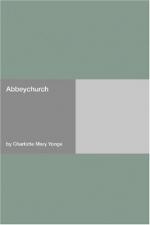‘Bounce, no,’ said Katherine; ‘it is bonnet, I wrote it myself.’
’Then why do you make your ‘t’ so short?’ said Rupert; ’I must give you a writing lesson, Miss Kitty.’
‘I must give you a lesson in silence, Mr. Rupert,’ said Elizabeth.
‘I obey,’ said Rupert, with a funny face of submission, and taking up his paper and pencil; but in a minute or two he started up, exclaiming, ‘What are they saying about Oxford?’ and walked into the next room, intending to take part in the conversation between his father and uncle. Mr. Woodbourne, however, who was no great admirer of Rupert’s forwardness, did not shew so much deference to his nephew’s opinion as to make him very unwilling to return to the inner drawing-room, when Anne came to tell him that all the poems were finished, and Elizabeth ready to read them aloud.
‘So this is all that you have to shew for yourself,’ said Elizabeth, holding up a scrap of paper; ‘what is all this?’
‘A portrait of Miss Merton,’ said Rupert; ’do not you see the poet’s eye in a fine frenzy rolling?’
‘Is it?’ said Elizabeth; ’I took it for Miss Squeers in the agonies of death, as I see that is the subject of the poem—all that there is of it, at least.
Did ever you see a stupider
poem?
Pray who is the author?
I know him, I know him,
He went to school to Mr. Squeers,
Who often made the youth shed
tears.
Now for the next, which is nearly as short.
I will write a poem,
Clear and flowing,
It will make you shed tears,
And excite your fears.
’Tis about a witch,
Drowned in a ditch,
Your tears come from your
eyes.
If you are wise,
Don’t make a Bounce,
Or you’ll tear your
flounce,
And upset the sugar Jar,
Which I cannot spare,
I must give some to Francis,
So well he dances;
Sugar canes packed up in leaves,
The canes are tied up like
wheat sheaves;
Francis wears a scarlet Jacket,
He made a dreadful racket
At Harrogate,
Because he had to wait,
In a field of barley,
To hold a parley,
About a bone of marrow;
His heart was transfixed by
an Arrow,
By a lady in velvet,
And he was her pet.’
All laughed heartily at this poem, which perhaps diverted them more than a better would have done; Harriet was highly delighted with what she considered their applause, though she knew that of all the rhymes, scarcely three had been found by herself.
‘Why, Mr. Merton, what are you doing?’ asked Harriet; ’are you writing any more?’
‘Oh! I hope he will tell us about Mr. Squeers,’ said Katherine.
No one could doubt that the next which Elizabeth read was her own.




